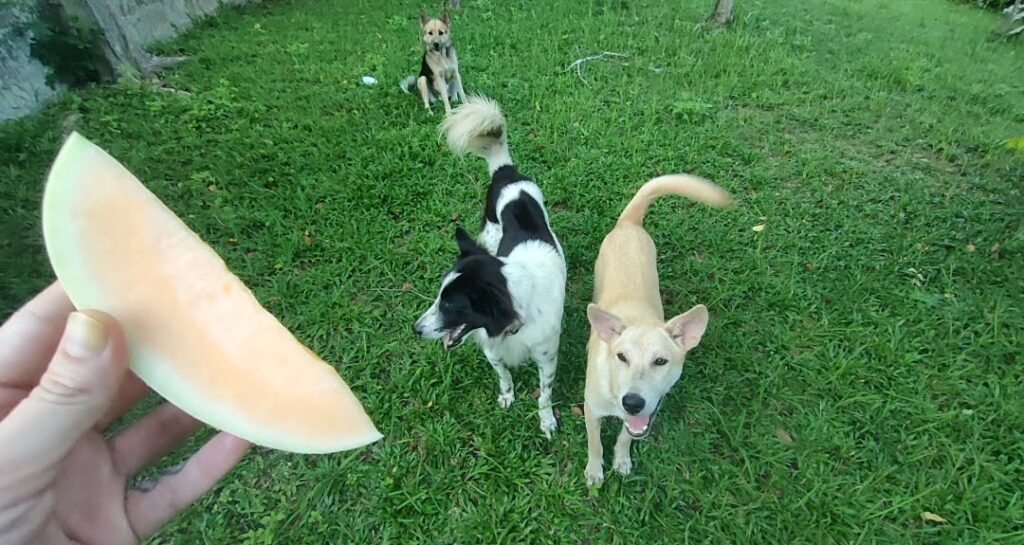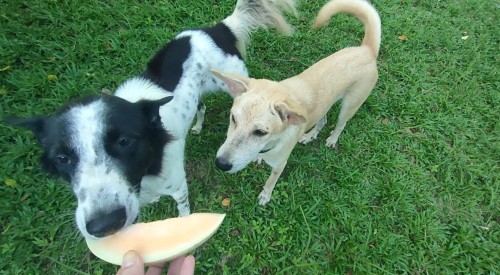Dog owners might have noticed that dogs are constantly interested in different types of foods, including some tasty fruits. You might wonder: can dogs eat cantaloupe and honeydew melon? Is it good or bad for them? Does it bring any benefit to their overall diets? We will discuss all of that in the following topics!
Can Dogs Eat Cantaloupe?

As a dog owner, it may be challenging to keep track of which fruits your canine friend is permitted to ingest. Therefore, can dogs consume cantaloupe?
Yes, the delectable melon is safe for canines to consume in moderation and may serve as a healthy substitute for typical treats, particularly if your dog is overweight.
Even though the seeds are innocuous, you should avoid purposely giving them to your dog, since they might pose a choking danger.
Risks of Eating Cantaloupe
There are a few hazards related to cantaloupe feeding to dogs.
As with watermelon rinds, cantaloupe rinds may cause gastrointestinal irritation and get lodged in your dog’s digestive tract.
Additionally, their stiff, fibrous skins provide a choking threat.
Cantaloupe, like any other food that is not a necessary part of a dog’s diet, should be had in moderation.
Too many treats combined with an otherwise balanced diet might result in canine obesity. Additionally, this fruit is heavy in sugar and may not be suitable for diabetic dogs.
Consult a veterinarian if you have any questions or concerns about giving cantaloupe to your dog.
Can Dogs Eat Honeydew?
Honeydew is a delectable and flavorful fruit that is adored by people the world over. However, is honeydew toxic to dogs?
Yes, dogs may safely consume honeydew if they are not allergic to it and consume it in moderation. Honeydew is a delicious and healthful treat for your dog.
It’s essential to take honeydew in moderation since it contains natural sugar, which may cause health concerns if consumed in excess.
It is advised that you consult your veterinarian prior to introducing new kinds of food to your dog since they will have a better grasp of your dog’s health.
Let us investigate the effect of dogs eating honeydew.
Risks of Eating Honeydew
In certain situations, honeydew may induce diarrhea, particularly if the honeydew has been exposed to microorganisms or has high sugar content.
This includes moldy honeydews.
Other times, it might be hazardous to dogs since they are less capable of digesting them than people are, which may result in digestive issues such as vomiting or bloating.
Honeydew may cause stomach distress in some dogs, however, this is normally the case only if your dog has other health problems.
Honeydews are heavy in sugar and should be given to big breeds only once or twice a week.
Honeydew should never be given to diabetic dogs, dogs with renal disease, or dogs with cardiac issues. Consume honeydews sparingly due to their high sugar content.
Can Dogs Eat Melons?

While it may seem to be an easy question of whether your dog can eat cantaloupe with you, it might get a bit more complicated.
Melon is a fruit that is reasonably safe for dogs to ingest.
But as with any new food, it is generally prudent to gradually introduce it to your dog to see whether or not your dog has an allergy or has difficulty digesting it.
Although melon has several health advantages for humans, giving it to your dog requires some degree of caution and prudence.
As with everything else, moderation is critical. Melon is safe for dogs to consume in small amounts, as it is a nutrient-dense fruit that is low in calories and high in water and fiber.
When giving melon to your dog, it is better to offer them portions without the rind.
Can Dogs Eat Cantaloupe & Honeydew Melon FAQ
Can I Give My Dog Cantaloupe?
Cantaloupe is a high-fiber fruit that is also high in vitamin B6, niacin, folate, vitamin A, vitamin C, and potassium.
Additionally, it is low in calories and rich in water content, making it a delectable method to rehydrate without gaining weight.
Vitamins A and C provide several health advantages for dogs, most notably their antioxidant properties.
Antioxidants are critical for scavenging free radicals, which slow the aging of cells, maintain healthy cell function, and may help lower the risk of certain illnesses.
Cantaloupe’s high water and fiber content can aid in digestion and avoid constipation and dehydration.
Is Melon Good For Dogs?
Melon is a sugary sweet treat that is acceptable for the majority of dogs, with the exception of puppies with diabetes. Due to the high sugar content, it is not recommended to feed melon to a diabetic dog.
Melons are rich in vitamin B and C and have a potassium value comparable to bananas.
Additionally, it includes trace amounts of copper and iron, which contribute to the health of red blood cells.
Final Words About Can Dogs Eat Cantaloupe & Honeydew Melon
Can Dogs eat cantaloupe and honeydew melon? Yes, they definitely can if fed in small amounts! Is it good or bad for them?
As with everything you feed your dog, feeding a bit of melon will be safe and even healthy if you feed it once in a while. However, if your dog is diabetic, then avoid giving it to him by all means.
Table of Contents
